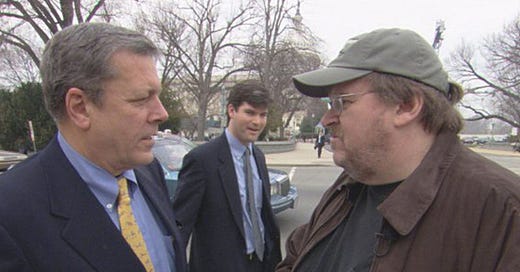Heroes of the Zeroes: Bowling for Columbine / Fahrenheit 9/11 / Sicko
Heroes of the Zeroes is a daily, alphabetical look back at the 365 best films from 2000 to 2009. Today's entry counts as three films.
"Bowling For Columbine" / "Fahrenheit 9/11" / "Sicko" Rated R / Rated R / Rated PG-13 2002 / 2004 / 2006
If “The Lord of the Rings” served as a long lament for Middle-Earth’s plight, Michael Moore’s “Bowling for Columbine,” “Fahrenheit 9/11” and “Sicko” cumulatively formed an epic eulogy for the middle class on planet Earth.
Each “documentary” generally built on Moore’s precedents for rising rage at political power wholesaled for personal gain while America gasped for air with a boot of fearmongering and financial collapse on its windpipe.
The quotes around “documentary” are for purists who would cast Moore as someone whose blatant self-insertion into his subject matter ruins the ever-sacred objectivity of documentaries. They’d be right. But last decade, Moore no longer wanted to be either objective or the underdog — he proclaimed himself the agitprop gadfly for the perspective and personality of John Q. Public.
Wielding his deep archival footage like a sword, he offered wickedly acute commentary on 10 years of American ills.
His first Zeroes film — 2002’s “Bowling for Columbine” — makes up the laugh-riddled opening paragraph of Moore’s thesis. He interviews rubes who also happen to be gun-toting nutcases, as well as James Nichols — brother to convicted Oklahoma City bomber Terry Nichols — in a chat that’s both comedic and chilling.
Although “Columbine” doesn’t directly tackle 9/11, it predates Moore’s sharp turns toward somber, abstract work. It seeks an explanation for America’s obsession with violence throughout history — a slippery notion Moore pursues with his trademark wit and quiet fury. His idea is that necessary fear has been bred into us to the point that the threat needs no longer be specific — that we take up our arms at all times lest we be caught with our guard down.
This only kicked off Moore’s clearheaded, convincing expressions of the way fear, violence and the resultant ignorance can whittle away a country’s soul.
2004’s “Fahrenheit 9/11” — in which he trained his sights on President George W. Bush’s War on Terror — was decried by haters as a Democratic ploy to boost Sen. John Kerry to victory over Dubya’s attempt at presidential reelection. Only the most frayed fringes of the farthest right could have seen it that way — Moore’s backhanded complement to the Dems was that their complacency made them lesser fools than Bush’s then-active Republican administration.
“Fahrenheit 9/11” remains Moore at his most serious, and the passion shows with trimmed-back cutesy self-insertion bits and cartoonish clowning. Critics conveniently slapped this as a liberal fantasy, but what Moore had to say came off as the words of neither a blowhard nor a partisan wag. What he sought was the demand that we, as citizens and regardless of political affiliation, should make of the propriety of our elected officials.
Moreover, it ends with a touching tribute to patriotism and duty — perhaps a shocker for some to hear that Moore, generally speaking, is with the troops. And with all the greased palms and backroom deals, it’s hard to argue Moore’s thorough, damning critique of the Bush II administration. “Fahrenheit” issued a direct challenge: If the claims were false, shoot down the message and the messenger through evidentiary proof.
Personal faith can only take a public so far without proof that their sacrifices are righteous. “Fahrenheit” is incendiary, but something anyone with an interest in politics as they played out over the past decade owes it to themselves to see and debate. Reaching across party lines is Moore’s idea that any American fight should be one that goes unexploited when it comes to protecting freedom.
2006’s “Sicko” — his deconstruction of the for-profit American healthcare industry in comparison to other nations’ not-for-profit equivalents — sure seems awfully prescient now and proves as infuriating in spots as “Fahrenheit 9/11.”
Saddening while it still bristles with satire, “Sicko” does dodge some of the larger political questions now in play about healthcare reform. Plus, the Cuba stunt — in which he takes poor sick Americans to Castro’s nation to be treated and get well — mars what is, up to that point, a relatively stunt-free film.
Though still an affecting lament for another pocket of America’s lost promise, 2009’s “Capitalism: A Love Story” was less a magnum opus than an overreaching step back. Plus, it seems like easy-lay narration about someone little more than a year into the job to say of President Barack Obama, “In one instant, it was a farewell to the old America.”
Here, here for change and the promise of new direction. For America’s sake, let’s hope that The Teens don’t prove to be as frighteningly productive a decade for Moore as The Zeroes turned out to be.



